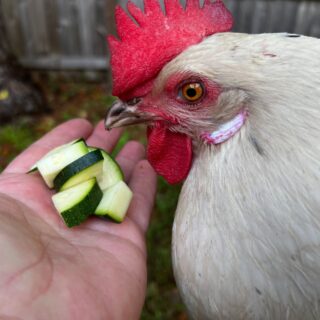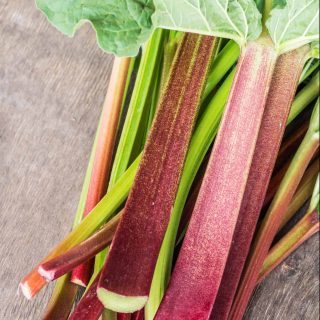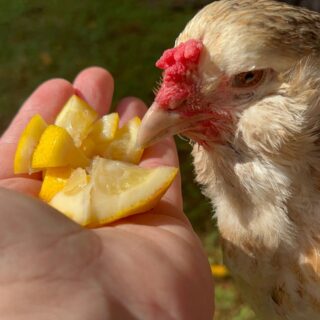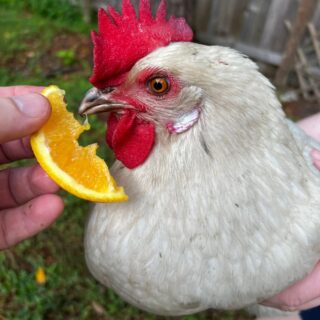Yes, chickens can eat pears as a nutrient rich treat. Pears are safe for chickens to eat whole, raw, cooked. The entire pear is safe to eat (except the pit), flesh, skin, seeds, and stem, so no worries about accidentally feeding your chickens something dangerous.
Make sure to keep reading for details on the benefits of pears, how to feed them and more.
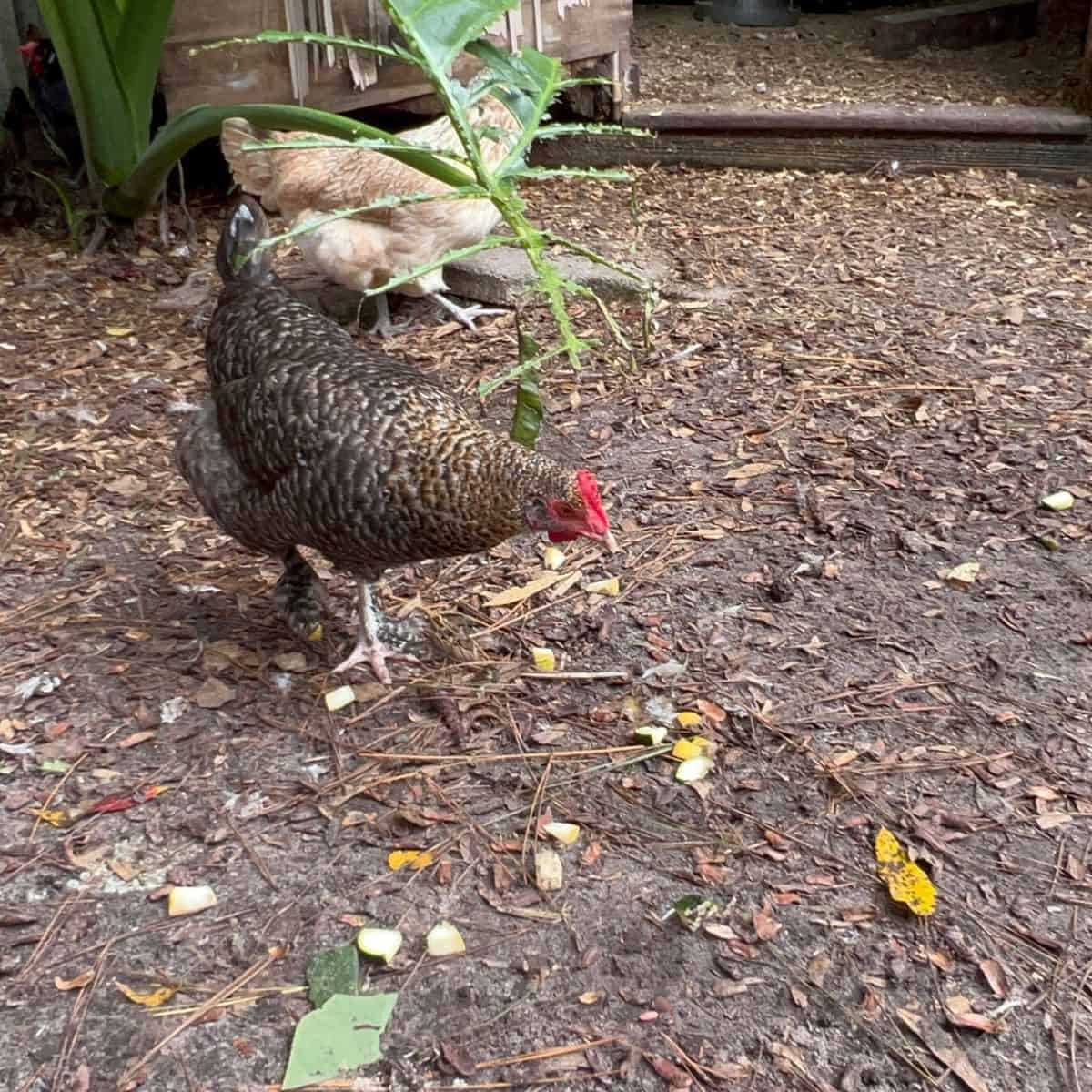
Jump to:
Are Pears Safe for Chickens?
Yes, pears are safe for chicken. And, they love to eat them. Healthy treats are an important part of keeping healthy chickens and should be incorporated into their diet. You can feed them treats during their routine health checks.
Much like when chickens eat oranges, chickens eat nectarines, when chickens eat raisins, and when chickens eat peaches, you need to be cautious about how much you feed. Due to the sugar content, you will only want to feed about one pear per five chickens and between two and four times a week.
A single cup of Bartlett pear has a whopping 14 grams of sugar! That is a ton, especially when you consider the average hen weighs less than 3 kilograms.
Overeating sugar is just as bad for chickens as it is for humans. It can lead to obesity, egg laying issues, liver problems and many more things.
Can Chickens eat pear skins?
Yes, chickens can eat pear skins. If you are just feeding the skins, they may not enjoy those as much as the whole fruit. The skins contain a majority of the nutrients in the pear, so you certainly dont' want to exclude it when feeding pears to your chickens.
Can chickens eat pears whole?
Yep, chickens can eat pears whole. Now, they aren't going to just gobble it in it's entirety. They will likely peck pieces off and eat it bit by bit.
Can chickens eat pears raw?
Yes, chickens can eat pears raw just like humans do. Raw pears are the most common way pears are eaten.
Can chickens eat pears cooked?
Yes, chickens can eat cooked pears. However, you want to ensure that they weren't cooked with dangerous additives like sugar, alcohol or other foods that chickens cannot have.
Can chickens eat pear seeds?
Yes, chickens can eat pear seeds, but they may be a choking hazard. You may have heard that their seeds are poisonous. And technically, like feeding chickens apples, they do contain a small amount of cyanide. However, if they get a seed or two, they will likely be OK.
It would probably take half an orchard to amass the quantity it would take to become dangerous. Maybe that's a bit of an exaggeration, but I think you get the point.
Need some help keeping your chickens health and care taken care of? Check out the Organized Chicken Keeper for an easy to follow system.
How Do You Feed Pears to Chickens?
- Wash the pear first
- You can toss the whole pear out to them to peck at, or you can cut it into chunks.
- Cutting it into chunks helps make more pieces so all your chickens get some and fight over them less.
If you want to mix things up a little you can literally mix things up by making a fruit salad or chicken treat medley. Most likely, your chickens aren't going to really care about clashing flavors so feel free to add in whatever snacks you like.
Since chickens can eat peanut butter you can use it to make a chicken treat ball. Chickens can eat blueberries, chickens can eat blackberries, chickens can eat radishes, rhubarb, and chickens can eat unseasoned rice. Roll them all together and feed it as a treat.
You can also take a mix of treats and string them together with fishing line. Now, hang is somewhere your chickens like to hang out and watch them have one peck of a good time with their new chicken toy!
Benefits of Pears
Yes, pears can be a healthy snack when given in moderation. In spite of the high level of sugar, pears contain a ton of water which will help your chickens stay hydrated. If they need even more hydration, chickens can eat watermelon and chickens can eat radishes which both also have high water content.
Here are some of the important nutrients chickens get from pears and what they do:
- Vitamin A: eyes, skin, immune health and stress support. Chickens can eat zucchini if they need more vitamin A.
- Vitamin C: joint, cellular, and immune health; collagen synthesis and overall egg laying.
- Calcium: bones and egg shell strength
- Copper: cardiovascular, bone growth, glucose metabolism and a ton more.
- Fiber: GI health, nutrient absorption and overall growth. Chickens can eat apples and chickens can eat raisins for even more fiber content.
- Vitamin K: blood clotting, bone metabolism, vision and more. Chickens can eat peaches if they need more.
- Magnesium: cellular metabolism, heart health and bone strength and development. Chickens can eat sweet potatoes to get even more magnesium.
- Manganese: bone development, egg shell quality, immune system and more
- Potassium: electrolytes, hydration and temperature control.
The table below, courtesy of the USDA FoodData Center, has a breakdown of the nutritional analysis based on a serving size of 1 cup (140g) raw Bartlett pear.
| Name | Amount | Measurement |
|---|---|---|
| Water | 118.0 | g |
| Energy | 88.2 | kcal |
| Protein | 0.5 | g |
| Total lipid (fat) | 0.2 | g |
| Carbohydrate, by difference | 21.1 | g |
| Fiber, total dietary | 4.3 | g |
| Sugars, Total NLEA | 13.6 | g |
| Calcium, Ca | 11.2 | mg |
| Iron, Fe | 0.2 | mg |
| Magnesium, Mg | 8.0 | mg |
| Phosphorus, P | 14.0 | mg |
| Potassium, K | 122.0 | mg |
| Sodium, Na | 9.8 | mg |
| Zinc, Zn | 0.1 | mg |
| Copper, Cu | 0.098 | mg |
| Manganese, Mn | 0.045 | mg |
| Selenium, Se | 0.280 | µg |
| Vitamin C, total ascorbic acid | 6.160 | mg |
| Vitamin B-6 | 0.036 | mg |
| Folate, total | 8.400 | µg |
| Vitamin A, RAE | 1.400 | µg |
| Carotene, beta | 11.200 | µg |
| Vitamin K (phylloquinone) | 5.3 | µg |
| Vitamin B-6 | 0.2 | mg |
| Vitamin A, IU | 11,500.0 | IU |
| Vitamin E (alpha-tocopherol) | 0.4 | mg |
| Vitamin D (D2 + D3) | 0.0 | µg |
| Vitamin K (phylloquinone) | 1.4 | µg |
Feeding Chickens Pears FAQs
Yes, you can overfeed chickens with pears which can lead to a host of health issues. Try to stick to a 10% of their diet from treats rule.
Yes, baby chicks can eat pears, but be very mindful of giving them just a tiny serving.
In Conclusion
Pears are a healthy snack for chickens that provide hydration, fiber and a ton of vitamins and minerals. Their sweet flavor makes chickens eager to eat the as well.
If you need more help with taking care of your chickens, check out The Organized Chicken Keeper for a complete system for managing their health through keeping their supplies stocked and coop clean.

